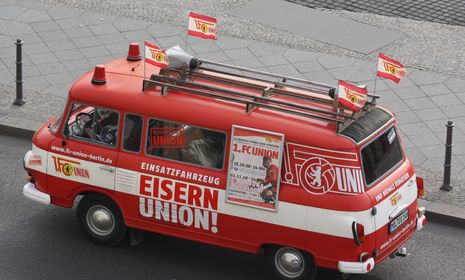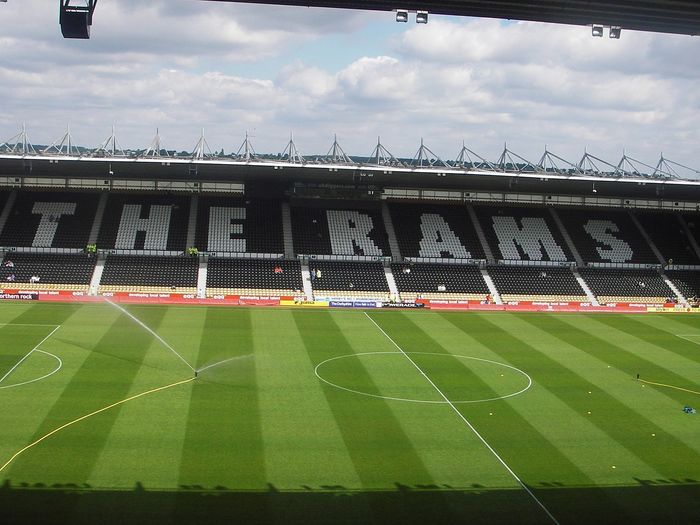Union Berlin: an antidote to commercialism in modern football
Tom Bullivant celebrates the authenticity and charisma of the German top-flight side ahead of their UEFA Europa Conference League clash against Slavia Prague on Thursday (09/12)

Everyone wishes they were a Union Berlin fan. The club, who play in Germany’s first division known as the Bundesliga, have one of the most romantic footballing stories of recent years, which is hopefully only just at its beginning. In the current footballing climate of the attempted European Super League, £100m transfers becoming the norm, and many of the game’s smaller clubs struggling more than ever, Union are proving that money is not everything in football.
Most clubs have close ties with their fans, with many having fan representation on their boards. Some clubs have closer ties than others – think Portsmouth, who were saved from administration by fan ownership that lasted until 2017. Union, however, owes its fanbase everything. When the club, based in East Berlin’s Köpenick, faced financial trouble in 2004, fans flocked to blood donation centres across Berlin to give blood. In Germany, you are paid for donating blood, and so the fans gave all the money they earned back to the club; the team survived, and this was not the only problem they helped solve.
“The club’s fans have gone from giving blood and laying bricks in order to keep the team afloat to booking European away days in less than fifteen years”
In the 2008-09 season, Union became one of the founding members of Germany’s new 3. Liga, but their dilapidated stadium did not meet league standards. As a result, more than 2,000 fans devoted over 140,000 hours of unpaid labour to rebuild the Stadion An der Alten Försterei, which the team plays in today. For Union, the club and the fans are indistinguishable. The common football maxim states football is nothing without fans, and this is more true for Union than anyone else.
Since 2009, the only way for Union has been up. In that year, the club, nicknamed Die Eisernen (The Iron Ones), were promoted to the Bundesliga 2, where they remained until 2019 when the side finally reached the heady heights of the Bundesliga, attaining top-flight status for the first time in the club’s history. Surprising many, Union have thrived since promotion. Despite having the smallest stadium in the division, and a bank balance to match, the club defied relegation predictions and finished a respectable 11th place in their first season, beating European giants Borussia Dortmund 3-1 along the way.
Last season (2020-21), however, they really shone. Their team of unlikely lads featured breakout Nigerian striker and Liverpool loanee Taiwo Awoniyi, veteran captain Christopher Trimmel, and former Germany international and Bundesliga icon Max Kruse. Yet interestingly, the team has no real stars. All of Union’s goals were shared between fifteen players, showing the squad’s cohesion and lack of reliance on one sole player, and their wage bill was the third lowest of any team in the league. In spite of this, Union were the only team Bayern Munich failed to beat, they defeated Dortmund at home for the second successive year, lost only once at home, and placed seventh overall.
“The common football maxim states football is nothing without fans, and this is more true for Union than anyone else”
This finish meant they qualified for the European Conference League ahead of German juggernauts Borussia Mönchengladbach and VfB Stuttgart and, more importantly, their Berlin rivals Hertha Berlin. Union will play Czech outfit Slavia Prague in their final group game on Thursday (09/12), as they look for a win to secure their place in the next round.
For romantic football fans, their final game of last season was perfect. Needing a win, Union came up against RB Leipzig, the club hated by most Germans for being the antithesis of what Die Eisernen represents. In the 92nd minute, Kruse scored a header to make it 2-1, sending the Alten Försterei into pandemonium and Union into Europe.
Union’s success has been a genuine, and sadly rare, fairy tale in the sanitised, commercialised modern game. The club’s fans have gone from giving blood and laying bricks in order to keep the team afloat to booking European away days in less than fifteen years. Call me weird, but I’d rather watch Union on a Thursday night against Feyenoord than PSG face Leipzig in the materialistic football derby of this year’s Champions League. I’d much rather go to Union’s stadium than PSG’s too, where three of the four stands are standing-only and produce an authentic fan experience.
The current footballing climate is largely revenue focused; just look at the Super League project and the biennial World Cup proposal. Fans are simply treated as customers. At Union, none of this is present. It’s certainly hard to imagine Union selling the naming rights to their stadium any time soon. The club’s entire focus is fan-oriented, the relationship between club and fans is commendable and there is a genuine emotional connection there - it’s not everywhere that fans gather yearly for a carol concert on a team’s pitch. Nor is it common to get a real harmony between the club hierarchy and fanbase. Union, once a hub of rebelliousness in East Berlin, are breaking modern stereotypes and rebelling against the modern game, giving football a taste of what it both needs and misses.
So, if you’re looking to watch a club with a different approach to Manchester City or PSG, a club with an inspiring story, incredible, passionate and loud fanbase, and one on its way up in the world, do your weekly essay on a Tuesday or Wednesday night and save your Thursday to watch Union Berlin.
 News / University Council rescinds University Centre membership20 February 2026
News / University Council rescinds University Centre membership20 February 2026 News / Hundreds of Cambridge academics demand vote on fate of vet course20 February 2026
News / Hundreds of Cambridge academics demand vote on fate of vet course20 February 2026 News / Judge Business School advisor resigns over Epstein and Andrew links18 February 2026
News / Judge Business School advisor resigns over Epstein and Andrew links18 February 2026 News / Union cancels event with Sri Lankan politician after Tamil societies express ‘profound outrage’20 February 2026
News / Union cancels event with Sri Lankan politician after Tamil societies express ‘profound outrage’20 February 2026 News / Caius students fail to pass Pride flag proposal20 February 2026
News / Caius students fail to pass Pride flag proposal20 February 2026










